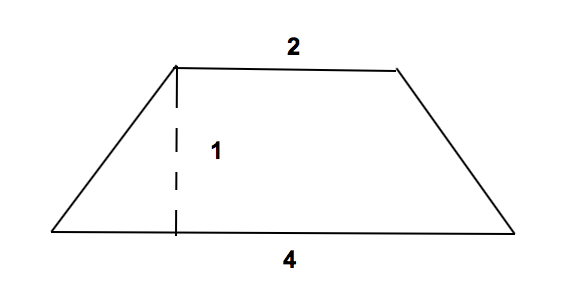All ISEE Lower Level Quantitative Resources
Example Questions
Example Question #7 : How To Find A Square On A Coordinate Plane
Square 





The perimeter of square 


To find the length of the square look at the coordinates:
Thus,
Example Question #231 : Geometry
The points with coordinates 
Kite
Square
Parallelogram
Trapezoid
Square

If the points are plotted on to a graph, you should notice that the points form a square with side lengths of 
Example Question #1 : Trapezoids

What is the area of a trapezoid if its height is 1, its long base is 4, and its short base is 2?
The area of a trapezoid is given by the formula 
We know that the height is 1, the long base is 4, and the short base is 2.
Example Question #1 : Plane Geometry
Which formula would you use to find the area of a trapezoid?
The find the area of a trapezoid, use:
Example Question #1 : Quadrilaterals

The above diagram shows a trapezoidal home within a rectangular yard. What is the area of the yard?
The area of the yard is the area of the small trapezoid subtracted from that of the large rectangle. The area of a rectangle is the product of its length and its height, so the large rectangle has area

The area of a trapezoid is half the product of its height and the sum of its two parallel sides (bases), so the small trapezoid has area

The area of the yard is the difference of the two:

Example Question #2 : Quadrilaterals

Note: Figure NOT drawn to scale.
Mr. Smith owns the triangular piece of land seen in the above diagram. He sells the trapezoidal parcel shown at bottom right to his brother. What is the area of the land he retains?
The area of a triangle is half the product of its base and its height, so Mr. Smith's parcel originally had area

The area of a trapezoid is the half product of its height and the sum of its two parallel sides (bases), so the portion Mr. Smith sold to his brother has area

Therefore, Mr. Smith retains a parcel of area

Example Question #1 : Plane Geometry

What is the area of the above trapezoid?
The formula for the area of a trapezoid is
In other words, find the average of the bases and multiply by the height. Substituting in the values of the bases for the given trapezoid, 

Example Question #6 : Plane Geometry

What is the area of the above trapezoid?
The formula for the area of a trapezoid is
In other words, find the average of the bases and multiply by the height. Substituting the values of the bases of the given trapezoid, 

The area of the trapezoid is thus 
Example Question #2 : Trapezoids
Find the perimeter of the following trapezoid.

In order to find the perimeter of the trapezoid, we have to add up all the outer sides:
Example Question #1 : Plane Geometry
Find the perimeter of the following trapezoid.

In order to find the perimeter we must add up all the outer sides of the trapezoid.
Certified Tutor
All ISEE Lower Level Quantitative Resources


























































